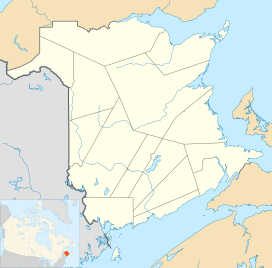| Mount Carleton | |
|---|---|
 View of Mount Carleton from Mount Head | |
| Highest point | |
| Elevation | 820 m (2,690 ft)[1] |
| Prominence | 625 m (2,051 ft)[1] |
| Listing | |
| Coordinates | 47°22′41″N 66°52′33″W / 47.37806°N 66.87583°W[2] |
| Geography | |
| Parent range | Appalachian Mountains |
| Topo map | NTS 21O7 Nepisiguit Lakes[2] |
| Climbing | |
| Easiest route | Hike |


Mount Carleton (French: Mont Carleton), at 820 metres (2,690 ft), is the highest peak in the Canadian province of New Brunswick, and the Maritime Provinces. Located in Mount Carleton Provincial Park, it is one of the highlights of the Canadian portion of the International Appalachian Trail. Mount Carleton is also part of the eighth and final section of the Nepisiguit Mi'gmaq Trail.[3] The mountain was named after Thomas Carleton, New Brunswick's first lieutenant governor,[4] and forms part of the Notre Dame Mountains chain, which is visible on Map 24 of the NB Atlas.[5]
Before aerial surveillance was extensively used, a hut was maintained on the summit for fire-spotting in the remote north-central part of the province. A very similar hut was maintained on Big Bald Mountain. Triangulation among these huts and other fire towers allowed the locations of wildfires to be determined quickly and easily.
Mount Carleton is a monadnock, an erosional remnant of resistant igneous rocks that remained after an ancient Mesozoic peneplain surface was uplifted in the Cenozoic to form a plateau, and subsequently dissected via millions of years of erosion by wind, water and glacial ice.[6][7][8][9] It consists of 400 million-year-old rhyolitic and basaltic volcanics.
- ^ a b "Mount Carleton". Bivouac.com. Archived from the original on 2020-09-26. Retrieved 2024-09-07.
- ^ a b "Mount Carleton". Geographical Names Data Base. Natural Resources Canada. Retrieved 2019-09-11.
- ^ "HISTORY - FRIENDS OF THE NEPISIGUIT MI'GMAQ TRAIL". Retrieved 2015-09-23.
- ^ Rayburn, A. (1975) Geographical Names of New Brunswick. Toponymy Study 2. Surveys and Mapping Branch, Energy Mines and Resources Canada, Ottawa
- ^ "NB Atlas, Second Edition (Revised 2002)". snb.ca. Retrieved 2019-09-11.
- ^ Wilson, R. A., M. A. Parkhill, and J. I. Carroll, New Brunswick Appalachian Transect: Bedrock and Quaternary geology of the Mount Carleton - Restigouche River Area, http://www.gnb.ca/0078/minerals/pdf/FieldG_Bdrk_Quatern_Geo_NE_NB-e.pdf
- ^ Roland, A. E. 1982. Geological Background and Physiography of Nova Scotia. Halifax: The Nova Scotian Institute of Science.
- ^ Cite error: The named reference
EB_monadnockwas invoked but never defined (see the help page). - ^ Mount Carleton Provincial Park Retrieved on 2007-08-18
